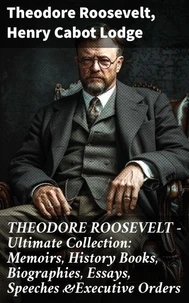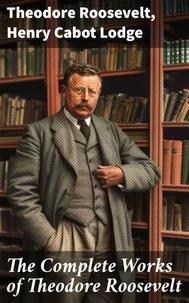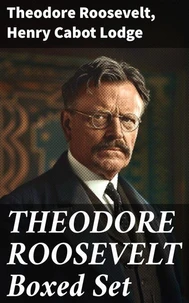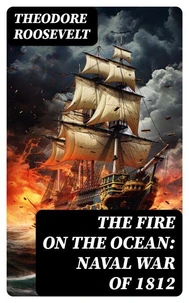African and European Addresses. Exploring Africa - Europe Relations Through Roosevelt's Words
Par :Formats :
Disponible dans votre compte client Decitre ou Furet du Nord dès validation de votre commande. Le format ePub est :
- Compatible avec une lecture sur My Vivlio (smartphone, tablette, ordinateur)
- Compatible avec une lecture sur liseuses Vivlio
- Pour les liseuses autres que Vivlio, vous devez utiliser le logiciel Adobe Digital Edition. Non compatible avec la lecture sur les liseuses Kindle, Remarkable et Sony
 , qui est-ce ?
, qui est-ce ?Notre partenaire de plateforme de lecture numérique où vous retrouverez l'ensemble de vos ebooks gratuitement
Pour en savoir plus sur nos ebooks, consultez notre aide en ligne ici
- Nombre de pages207
- FormatePub
- ISBN406-4-06-622823-1
- EAN4064066228231
- Date de parution11/12/2019
- Protection num.Digital Watermarking
- Taille530 Ko
- Infos supplémentairesepub
- ÉditeurGOOD PRESS
Résumé
In "African and European Addresses, " Theodore Roosevelt presents a collection of speeches and writings that encapsulate his views on international relations, imperialism, and the importance of American leadership on the global stage. The literary style in this compilation oscillates between persuasive oratory and reflective prose, underpinned by Roosevelt'Äôs vigorous enthusiasm for adventure and diplomacy.
Set against the backdrop of the early 20th century, the book deftly navigates the tensions and opportunities of colonialism, shedding light on the interplay between emerging global powers and the responsibilities that accompany such prominence. Theodore Roosevelt, the 26th President of the United States, was a figure of remarkable dynamism and complexity, deeply influenced by his experiences in politics, conservation, and military service.
His travels and encounters with diverse cultures galvanized his perspective on the world, culminating in this thoughtful exploration of America's role in the global theater. Roosevelt's passion for progress and belief in American exceptionalism resonate throughout the addresses, reflecting his ambitious vision for the United States as a force of positive change. This collection is highly recommended for scholars and enthusiasts of American history and international relations alike.
Roosevelt's articulate advocacy for American engagement, coupled with his personal anecdotes and vivid descriptions, offers readers not only a historical document but also a compelling narrative that echoes into modern discussions about leadership and responsibility on the world stage.
Set against the backdrop of the early 20th century, the book deftly navigates the tensions and opportunities of colonialism, shedding light on the interplay between emerging global powers and the responsibilities that accompany such prominence. Theodore Roosevelt, the 26th President of the United States, was a figure of remarkable dynamism and complexity, deeply influenced by his experiences in politics, conservation, and military service.
His travels and encounters with diverse cultures galvanized his perspective on the world, culminating in this thoughtful exploration of America's role in the global theater. Roosevelt's passion for progress and belief in American exceptionalism resonate throughout the addresses, reflecting his ambitious vision for the United States as a force of positive change. This collection is highly recommended for scholars and enthusiasts of American history and international relations alike.
Roosevelt's articulate advocacy for American engagement, coupled with his personal anecdotes and vivid descriptions, offers readers not only a historical document but also a compelling narrative that echoes into modern discussions about leadership and responsibility on the world stage.
In "African and European Addresses, " Theodore Roosevelt presents a collection of speeches and writings that encapsulate his views on international relations, imperialism, and the importance of American leadership on the global stage. The literary style in this compilation oscillates between persuasive oratory and reflective prose, underpinned by Roosevelt'Äôs vigorous enthusiasm for adventure and diplomacy.
Set against the backdrop of the early 20th century, the book deftly navigates the tensions and opportunities of colonialism, shedding light on the interplay between emerging global powers and the responsibilities that accompany such prominence. Theodore Roosevelt, the 26th President of the United States, was a figure of remarkable dynamism and complexity, deeply influenced by his experiences in politics, conservation, and military service.
His travels and encounters with diverse cultures galvanized his perspective on the world, culminating in this thoughtful exploration of America's role in the global theater. Roosevelt's passion for progress and belief in American exceptionalism resonate throughout the addresses, reflecting his ambitious vision for the United States as a force of positive change. This collection is highly recommended for scholars and enthusiasts of American history and international relations alike.
Roosevelt's articulate advocacy for American engagement, coupled with his personal anecdotes and vivid descriptions, offers readers not only a historical document but also a compelling narrative that echoes into modern discussions about leadership and responsibility on the world stage.
Set against the backdrop of the early 20th century, the book deftly navigates the tensions and opportunities of colonialism, shedding light on the interplay between emerging global powers and the responsibilities that accompany such prominence. Theodore Roosevelt, the 26th President of the United States, was a figure of remarkable dynamism and complexity, deeply influenced by his experiences in politics, conservation, and military service.
His travels and encounters with diverse cultures galvanized his perspective on the world, culminating in this thoughtful exploration of America's role in the global theater. Roosevelt's passion for progress and belief in American exceptionalism resonate throughout the addresses, reflecting his ambitious vision for the United States as a force of positive change. This collection is highly recommended for scholars and enthusiasts of American history and international relations alike.
Roosevelt's articulate advocacy for American engagement, coupled with his personal anecdotes and vivid descriptions, offers readers not only a historical document but also a compelling narrative that echoes into modern discussions about leadership and responsibility on the world stage.







